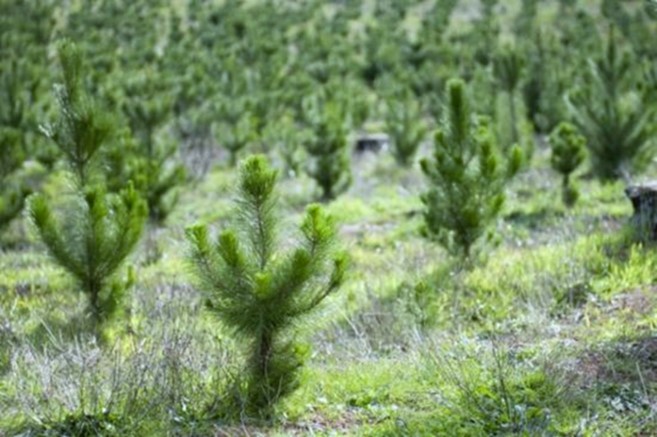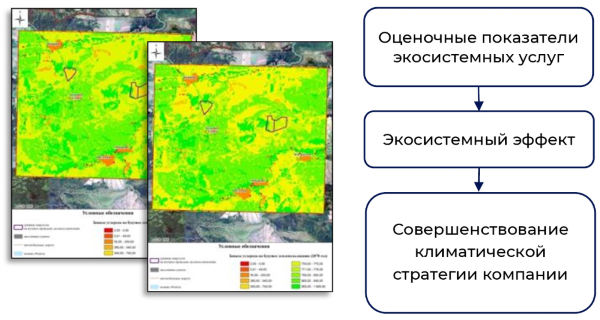Assessment of Ecosystem Services is an Important Factor in the Effectiveness of Climate-Forest Projects
Client

The company is an active participant in international markets. The extraction and primary processing of minerals negatively affect the environment and climate and upset the balance of ecosystems. In this regard, the company pays special attention to both reducing its own greenhouse gas emissions and restoring the absorbing function of ecosystems, considering such measures as an important factor in achieving carbon neutrality.
The company implements climate projects that increase the absorptive capacity of forests: tree planting, monitoring and early warning of fires.
Problem
Governments, investors and consumers are tightening business requirements on an increasingly wide range of issues, including negative impacts on the climate, destruction of ecosystems, declining biodiversity and reduced flows of ecosystem services. Under these conditions, the company must not only implement environmental initiatives and climate projects, but also competently justify their results.
 The company felt an urgent need to assess the ecosystem effectiveness of its forest projects in order to reasonably plan further activities, use them in climate reporting and provide data to stakeholders.
The company felt an urgent need to assess the ecosystem effectiveness of its forest projects in order to reasonably plan further activities, use them in climate reporting and provide data to stakeholders.
The company turned to us as professionals in the field of ecosystem services and biodiversity valuation and the calculation of greenhouse gas emissions, including reports for the CDP. Our 25 years of experience and high qualifications allowed us to look at the situation from all sides.
Solution
As part of the ecosystem assessment of forest projects, we identified and assessed all flows of ecosystem services (those providing, those regulating and those of a cultural nature) that are conserved and re-created as a result of forest restoration and monitoring.
In the course of our work, we answered difficult questions: How to most fully and accurately assess the effect of measures on ecosystems, including climatic effects? When exactly does the ecosystem effect arise depending on species composition, the age of trees and on the types of ecosystem services? We then developed a special toolkit using remote sensing data of territories and statistical research methods in order to solve these problems.

Based on the results of calculations, we identified a fairly high ecosystem effect due to forest projects, especially in terms of forest restoration (maintaining biodiversity and increasing the flows of ecosystem services which provide). At the same time, measures for forest monitoring and early warning of fires were not economically justified due to the high costs with a relatively low probability of fires
However, a very important result was obtained: climate projects increase the sustainability of the development of the territory and are characterized by high social efficiency. “Green” jobs are created that meet the criteria of the international documents of the OECD and the ILO standard, tax revenues to the budget are supported and much more.
Result
- Confirmed the importance of climate forestry projects. Evaluations of ecosystem services have shown that the activities carried out by the company contribute to the sustainable management of forest ecosystems, have a beneficial effect on human health and well-being and contribute to the sustainable development of territories.
- The company received comprehensive information for making investment and financial decisions. The assessments have shown the social and environmental significance of forest climate projects. It became clear how to increase the efficiency of forestry projects and which directions and methods of work are most promising.
- The possibilities of using the obtained data to improve the company's climate and environmental rating were determined.Quantitative values were obtained to form indicators of the effectiveness and efficiency of forest projects for submission to various international and Russian rating platforms in the field of climate change, biodiversity, ecosystem services and sustainable development (ESG approach).

As a result it was established that the results of climate related forest projects contribute to the achievement of:
- International initiatives, in particular SDGs 8, 13, 15, and the "One Trillion Trees" campaign
- National and regional commitments (Strategy of Environmental Safety of the Russian Federation, the National Project "Ecology", the Preservation of Biodiversity and the Reduction of Negative Impact on Natural Areas with a Protected Status).
The company's management, using the indicators obtained from us, will be able to objectively make investment and financial decisions, strengthen its authority in the eyes of: investors, the consumers of its products, the world community and members of public structures.

Write to us for advice on your project.
